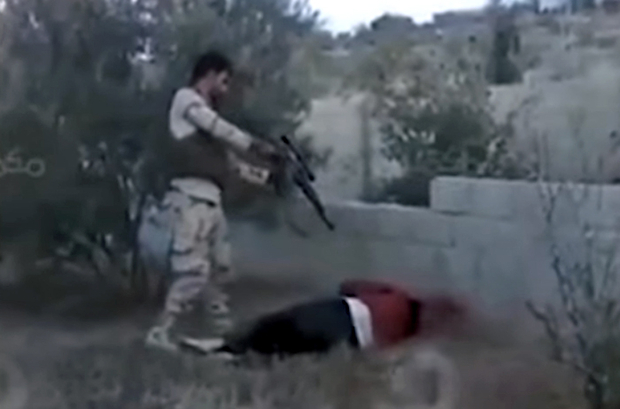Analysis
Cold-blooded executions in Sinai get tacit support from Trump
The United States continues to pledge support for Cairo’s war in the Sinai Peninsula, whose civilian death toll rises without scrutiny in the name of fighting ISIS.

They are unarmed and blindfolded. They are taken to a small clearing and executed. At the last moment, the soldier who pulls the prisoner by the shirt asked him a question: “Are you part of the Abu Sanana family?” The prisoner replied: “No, I swear to God, I am al-Awabadah.”
He is pushed to the ground, the blindfold is removed and he is shot. Two soldiers killed him, while third cries an order to hit him “not just in the head.”
The video of the execution of three people was apparently filmed on Dec. 6 in the Sinai Peninsula. It was indirectly confirmed by the armed forces that on the same day photos were published on social media of the three victims with rifles prominently set next to the dead bodies. According to the Egyptian army, they were terrorists killed in a firefight.
The reality is different. As shown in the video made public by Mekameleen TV, a network close to the Muslim Brotherhood based in Turkey, whoever those prisoners were, they were executed in cold blood even though they represented no threat, without trial or charges, and with weapons placed in plain sight next to corpses (a scene reminiscent of the five Egyptians massacred in March 2016 who were unsuccessfully blamed for Giulio Regeni’s death).
The pro-government website Youm7 says about the video, which showcases a war crime: It is a montage of the Brotherhood; the soldiers did not have an Egyptian accent.
The video certainly opens a small gash in the black hole that is the Sinai Peninsula. A place journalists cannot enter, where there is an ongoing military campaign against radical Islamist groups, in some cases linked to ISIS.
It’s a place where the government is present in the form of troops, but not in the form of economic investment and services, and where the most powerful tribes deal in human trafficking, weapons and kidnapping. It’s a place where monitoring is difficult due to the lack of information, and where human rights groups estimate dozens of those nearly 3,000 extrajudicial killings were carried out between 2013 and mid-2016.
But Cairo has no control over the territory, though it’s creating a false narrative that the government guarantees security. The war on Islamist terrorism proceeds with difficulty, even though President Abdel Fattah el-Sisi uses it as a banner to get support from the West and cover the real and rooted repression against civil society.
While the video was being broadcast on agencies and social media, the coup general met in Cairo with U.S. Defense Secretary James Mattis. The discussion focused on the war against ISIS, a common point reiterated two weeks ago at the White House meeting between el-Sisi and Trump.
Mattis was tasked to continue strengthening the alliance with Egypt, which had cooled slightly under Obama, but not so much as to really stop military aid. El-Sisi has sealed the friendship of Trump with a gift: the liberation of the American citizen Aya Hijazi, after 33 months in prison in Egypt, which had been denied to Obama.
The Pentagon chief has promised material support. Especially in Sinai, which has been in a state of emergency since October 2014, renewed without fail every three months: Prime Minister Sherif Ismail sent the last renewal request to parliament on Wednesday.
Sinai is far from newspaper headlines except when aseptic data on jihadist attacks or arrests or killings of Islamists are supplied (the latest was Thursday, when the leader of Ansar Beit al-Maqdis was killed). Some news agencies try harder, like Newsinai24, which publishes the names of the dead in the war against ISIS that too often affects civilians.
Yet the armed forces enjoy even greater impunity here than in the big cities: innocent deaths and displacement, confiscation and abuses that do nothing but widen the gap between the population and the government.
This impunity extends to the civilians who collaborate with the army and have become the paramilitary squads alongside the troops, under el-Sisi’s government. As recounted last year by the independent agency Mada Masr, the army needs local collaborators, people who are familiar with the places, families, individuals and tribes. In Sheikh Zuwayed and Rafah in 2016, four or five armed individuals were counted per group and in contact with the army, which provides them with ammunition, ID cards and security.
In return, they are asked to provide information, monitoring and participation in low-profile operations. Their presence is another element of tension. Some residents feel safer; others denounce abuses of collaborators who take advantage of impunity to make money. They take bribes from the families to release detainees and from smugglers to look the other way.
Originally published at https://ilmanifesto.it/esecuzioni-a-sangue-freddo-nel-sinai-di-al-sisi-e-trump/ on 2017-04-22
